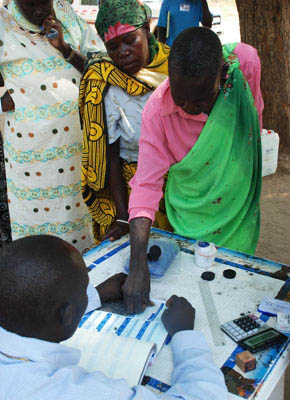
A week out from the conclusion of the registration period for South Sudan’s referendum, domestic and international observers are beginning to agree that the process, though not perfect, was credible. This emerging consensus is a positive indication of the technical quality of the remaining referendum period and will serve as a strong independent counter to challenges to the vote that may arise. There are indications that the ruling NCP will take legal recourse to undermine the referendum’s results—likely secession—but a widely deemed free and fair registration process will reduce the likelihood that such challenges will be taken seriously among the international community.
Most notably, the U.N. referendum panel, a U.N. monitoring body headed by former Tanzanian President Benjamin Mkapa and created by Secretary-General Ban Ki-moon, moved quickly to issue a statement just a day after registration ended, saying that the process was transparent and credible:
“The Panel believes that the process was transparent and free from organized manipulation: it was monitored by the Panel’s own teams across the country, as well as by domestic and international observers. The Panel notes that these achievements of the SSRC are the basis for a credible referendum which can take place on the scheduled date, 9 January 2011.”
In response to reports of campaigns that encouraged South Sudanese to only vote in South Sudan, the panel concluded, quite clearly: “They do not invalidate the credibility of the process.”
The clarity and speed with which the U.N. panel issued its first statement is a positive sign that the body intends to act as an opinion leader come time for the referendum results themselves. Many analysts believe that such a role is important because the panel, with its stature and global symbolism, can help forge acceptance among international actors and bodies of the referendum’s result. A division of responses from international actors is possible in the absence of a leading arbiter, potentially foster uncertainty, anxiety, and violence among the Sudanese leadership and communities on the ground.
Despite several “logistical, procedural, and security challenges,” the Carter Center said in its statement, “the [referendum] process was generally credible and represents a strong step toward the successful conduct of the referendum.” Registration was conducted peacefully, “with the notable exceptions of security incidents in Akobo and Kiir Adem in Southern Sudan,” according to the U.S.-based observation group.
In a statement released on Tuesday, SuNDE, a network of domestic observers across Sudan, did conclude that the registration process was “conducted free from violations that could significantly impact the integrity of the process.”
“Scattered incidents of intimidation were reported, but did not seem to be part of a broader pattern, and potential registrants were generally able to participate in the process without constraint,” it also said.
According to NDI’s South Sudan Director Traci Cook during a panel held at CSIS, the African Union panel on Sudan, currently involved in protracted negotiations on post-referendum issues and Abyei, may also be releasing its own statement. If so, the A.U. panel’s assessment will have a “positive slant” on the registration process, said Cook.
In the next few weeks, reports of continued legal challenges and threatening rhetoric from the North will undoubtedly continue. But, southerners hoping for a representative vote should be breathing a sigh of relief—a significant hurdle has been cleared.

